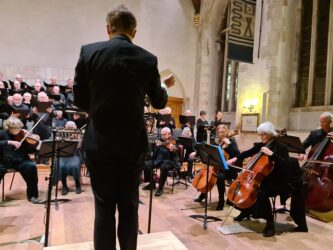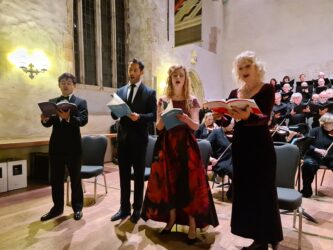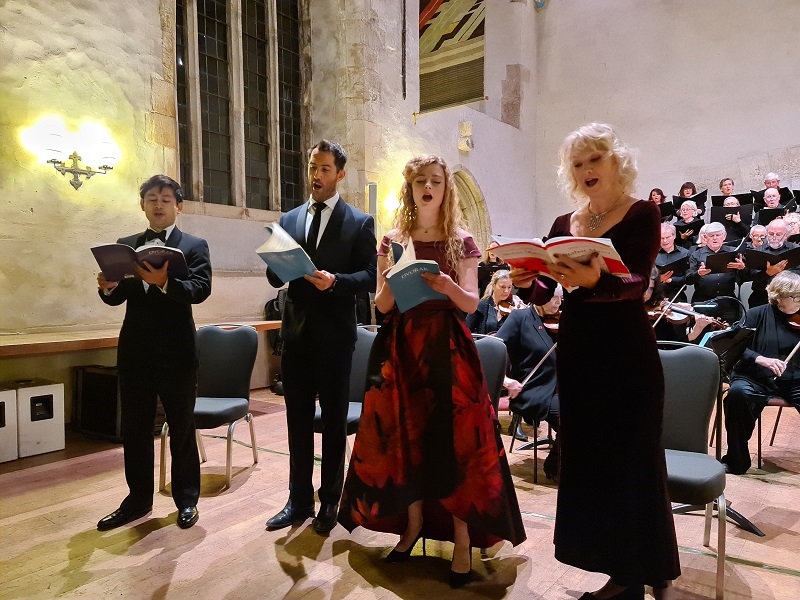 United Kingdom Dvořák: Catherine Hamilton (soprano), Charlotte Badham (mezzo-soprano), David Webb (tenor), Julian Chou-Lambert (bass), Dartington Community Choir, Dartington Sinfonietta / Simon Capet (conductor). Great Hall, Dartington, 14.11.2021. (PRB)
United Kingdom Dvořák: Catherine Hamilton (soprano), Charlotte Badham (mezzo-soprano), David Webb (tenor), Julian Chou-Lambert (bass), Dartington Community Choir, Dartington Sinfonietta / Simon Capet (conductor). Great Hall, Dartington, 14.11.2021. (PRB)

Dvořák – Stabat Mater
The medieval Great Hall on the Dartington Estate has presided over many epic performances, both external and those associated with the International Summer School. The superb edifice has been ominously silent for a couple of years, as the pandemic did its best to devastate all live music-making in its wake. Dartington Community Choir could scarcely have chosen a more apt work to flood the hall with music once more. Dvořák wrote his Stabat Mater at a time of immense personal anguish. He was also seeking a musical style that would eschew the overtly operatic flavour of Rossini’s Stabat Mater some forty years earlier, or Verdi’s larger-than-life Requiem just six years before Dvořák’s work.
The piece proved even more appropriate in that it was performed on Remembrance Sunday, when we think back to those who gave their lives in the two World Wars and in later conflicts. The choir also elected to dedicate their performance to the memory of friends and family who were no longer with them, since the singers were last in the Great Hall. Dvořák’s essentially down-to-earth musical creation strikingly brought home the fact that war, whether against a physical enemy or a virus, has the same disregard for life.
Lockdowns and restrictions have affected the sizes of many large choirs. Virtual rehearsals, no matter how successful they might be in practice, simply cannot replace what conductor Simon Capet reminded the audience in his brief opening remarks: nothing can be more spiritually or indeed physically uplifting than coming together to make music.
Dvořák’s Stabat Mater is divided into ten movements. Because of current regulations, they had to be performed without an interval. But any physical disadvantages of having to remain seated for some ninety minutes were outweighed by the work’s uninterrupted spiritual flow, even if in some ways this could have been a challenge for some audience members.
The work opens with a lengthy orchestral introduction. The Dartington Sinfonietta expertly led by Mary Eade did it real justice, setting the scene for what was to come. The composer’s instrumental requirements far outstrip the numbers in this orchestra, pared down no doubt for reasons of cost, but this was scarcely noticeable. The string sound, for one, seemed as rich as a section twice its size. The winds complemented this well, even if the omission of some second parts could not always result in a full ensemble sound.
When the choir entered, it struck me first of all how pure the soprano line was. This became a real feature as the work progressed and the range increased upwards. It would be churlish to suggest that choir members who had not made it back might have not been reaching their top notes quite so easily. Whatever the reason, I liked the choir’s sharper edge better. On the other hand, there seems to be a slight deficit in the number of tenors the ensemble can muster. Those present did a stalwart job, definitely aided by some ‘lady tenors’. This, of course, can afford an increase in volume, but it affects the timbre somewhat.

The four soloists are first heard in ensemble, and that soon pinpointed an issue with balance, due to individual vocal timbres. Soprano Catherine Hamilton and mezzo-soprano Charlotte Badham (in an alto role) can deliver great power right across the range, even though they know how to produce a hushed pianissimo when required. They both have that operatic ‘turbo-boost’ whenever the spirit of the music cried out for it. David Webb has all the vocal equipment of a native Italian tenor, which blended very well with the sopranos. This is no Verdi, but we need to remember that Dvořák actually wrote nine operas (though only Rusalka is performed with any regularity outside his native land), so any leaning towards opera would be perfectly acceptable here. By comparison, Brahms never wrote an opera; it would have been a complete anathema to him to have to endure a performance of his German Requiem with the merest whiff of the opera house about it.
Bass Julian Chou-Lambert did not appear to exude quite the same vocal and indeed operatic charisma as his fellow soloists. That had little bearing on the work’s first solo aria Fac, ut ardeat cor meum, which he despatched with sufficient gusto. It was in the soloist-ensembles, that a richer sound, one might say ‘more bass than baritone’, might have been better suited in an ideal world.
David Webb had a great opportunity to shine in his aria, Fac me vere tecum flere, and he took this on board with absolute relish. The purity of production, unwavering pitch, and sincere delivery are a winning combination, He also has that enviable knack of just letting the music flow, without the need for any exaggerated gesture, that would in any case be more at home on the opera stage. His duet with Catherine Hamilton, Fac, ut portem Christi mortem, was a joy to hear. The voices blended well together in terms of shared dynamics, breathing and articulation.
It is unlikely that when Dvořák was planning his Stabat Mater, he apportioned the solo and duet numbers on the strength of the singers he would have had at his disposal at the work’s debut in Prague in 1880. But giving the alto an individual solo proved a masterstroke in the present performance. Charlotte Badham’s rendition of Inflammatus et accensus was one of the most poignant moments in the whole work. Her immaculate breath control enabled her to deliver seamlessly the composer’s often long phrases. That gave the simple yet earnest text sufficient stage presence to bring it to life.
The choir had clearly done their homework, and there were many noteworthy moments along the way. The few men present gave the tenor soloist a good male-voice choir backing. They came into their own in the seventh movement, which calls for a fair amount of a cappella singing. The work finishes with an uplifting fugue on the word ‘Amen’, often considered par for the course. Here – rather like the musical roller-coaster it is – no one actually fell off, as it progressed towards its spirited and optimistic close in the major key.
Credit, as ever, must ultimately go to conductor Simon Capet – for his vision in planning something that was such an unmitigated success, for directing his soloists, choir and orchestra with absolute precision, for musical integrity and imagination. He also imbued this heartfelt performance with simple sincerity and so ensured that it was a truly special night to remember, however one might have related to it personally.
Philip R Buttall

A balanced and very appreciative critical response to what was a very special event for participants like myself in the choir, and audience. I personally found contributing to the event a very uplifting experience, especially in such an aptly poignant choice of piece for the times.